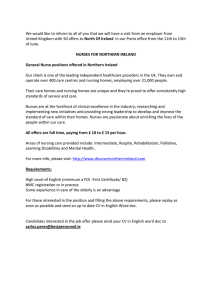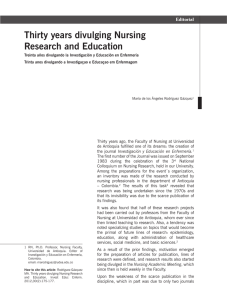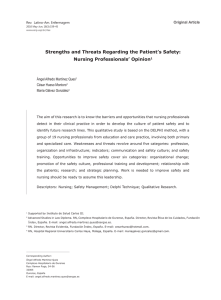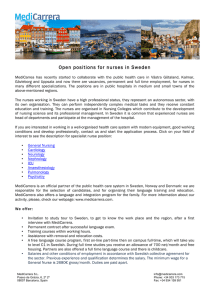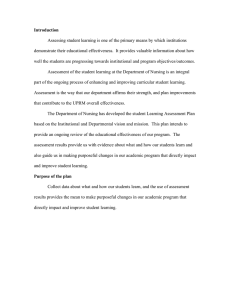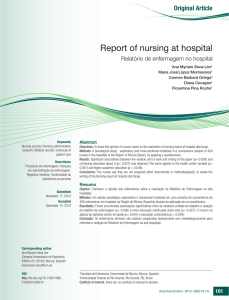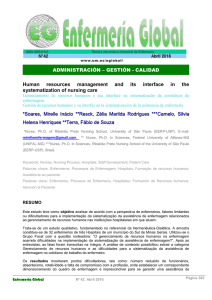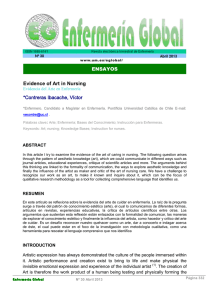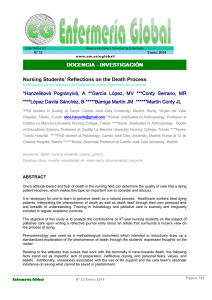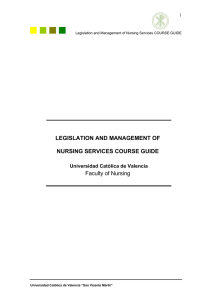Nursing teachers in clinical training areas: a phenomenological focus
Anuncio
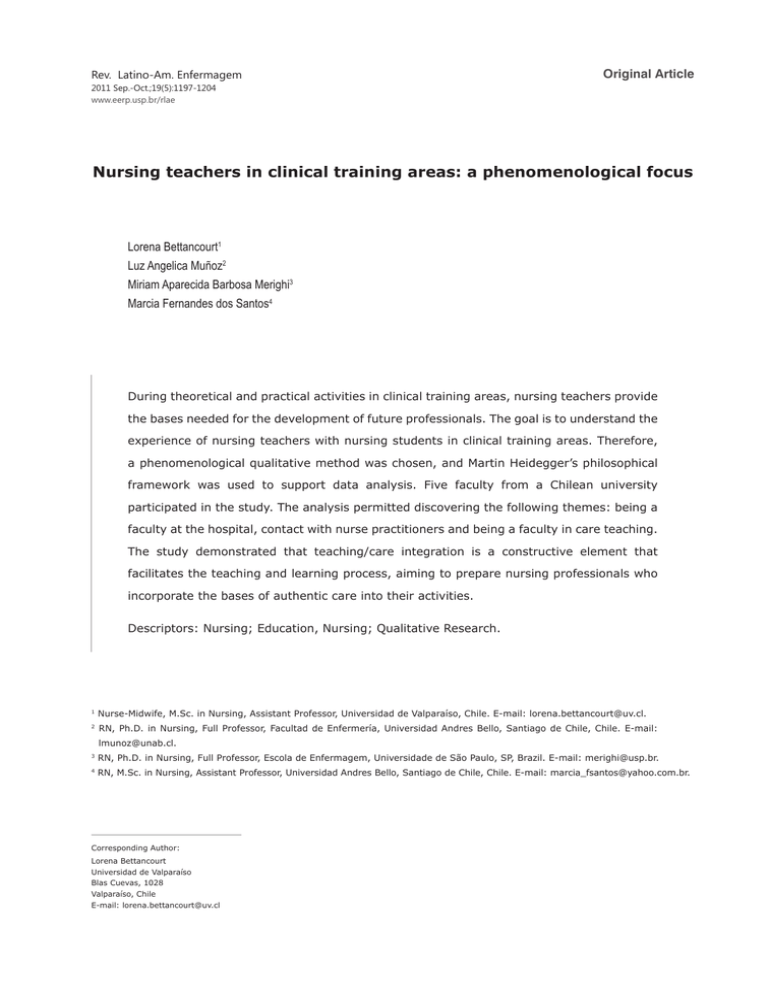
Rev. Latino-Am. Enfermagem Original Article 2011 Sep.-Oct.;19(5):1197-1204 www.eerp.usp.br/rlae Nursing teachers in clinical training areas: a phenomenological focus Lorena Bettancourt1 Luz Angelica Muñoz2 Miriam Aparecida Barbosa Merighi3 Marcia Fernandes dos Santos4 During theoretical and practical activities in clinical training areas, nursing teachers provide the bases needed for the development of future professionals. The goal is to understand the experience of nursing teachers with nursing students in clinical training areas. Therefore, a phenomenological qualitative method was chosen, and Martin Heidegger’s philosophical framework was used to support data analysis. Five faculty from a Chilean university participated in the study. The analysis permitted discovering the following themes: being a faculty at the hospital, contact with nurse practitioners and being a faculty in care teaching. The study demonstrated that teaching/care integration is a constructive element that facilitates the teaching and learning process, aiming to prepare nursing professionals who incorporate the bases of authentic care into their activities. Descriptors: Nursing; Education, Nursing; Qualitative Research. 1 2 Nurse-Midwife, M.Sc. in Nursing, Assistant Professor, Universidad de Valparaíso, Chile. E-mail: lorena.bettancourt@uv.cl. RN, Ph.D. in Nursing, Full Professor, Facultad de Enfermería, Universidad Andres Bello, Santiago de Chile, Chile. E-mail: lmunoz@unab.cl. 3 RN, Ph.D. in Nursing, Full Professor, Escola de Enfermagem, Universidade de São Paulo, SP, Brazil. E-mail: merighi@usp.br. 4 RN, M.Sc. in Nursing, Assistant Professor, Universidad Andres Bello, Santiago de Chile, Chile. E-mail: marcia_fsantos@yahoo.com.br. Corresponding Author: Lorena Bettancourt Universidad de Valparaíso Blas Cuevas, 1028 Valparaíso, Chile E-mail: lorena.bettancourt@uv.cl 1198 O docente de enfermagem nos campos de prática clínica: um enfoque fenomenológico No desenvolvimento das atividades teórico-práticas nos campos de prática clínica, o docente de enfermagem proporciona as bases necessárias para o desenvolvimento do futuro profissional. O objetivo proposto foi compreender a vivência dos docentes de enfermagem, junto aos estudantes de enfermagem, nos campos de prática clínica. Para isso, optou-se por metodologia qualitativa fenomenológica e, para fundamentar a análise dos dados, foi adotado o referencial filosófico de Martin Heidegger. Cinco docentes de uma universidade do Chile participaram do estudo. A análise possibilitou descobrir os seguintes temas: ser docente no hospital, a convivência com enfermeiras clínicas e ser docente no ensino do cuidado. O estudo demonstrou que a integração docente/ assistencial é elemento construtivo e facilitador do processo ensino/aprendizagem, buscando a formação de profissionais da enfermagem que incorporem, na sua atuação, as bases de cuidado autêntico. Descritores: Enfermagem; Educação em Enfermagem; Pesquisa Qualitativa. El docente de enfermería en los campos de práctica clínica: un enfoque fenomenológico El docente de enfermería en el desarrollo de las actividades teórico-prácticas en los campos de práctica clínica proporciona las bases necesarias para el desarrollo del futuro profesional. El objetivo propuesto es comprender la vivencia de los docentes de enfermería junto a los estudiantes de enfermería, en los campos de práctica clínica. Para ello se optó por una metodología cualitativa fenomenológica, y para fundamentar el análisis de los datos, se utilizó el marco filosófico de Martín Heidegger. Cinco docentes de una universidad de Chile participaron del estudio. El análisis posibilitó descubrir los siguientes temas: ser docente en el hospital, la convivencia con enfermeras clínicas y ser docente en la enseñanza del cuidado. El estudio demostró que la integración docente/asistencial es un elemento constructivo y facilitador del proceso de enseñanza y aprendizaje, que busca la formación de profesionales de enfermería que incorporen en su actuación las bases de un cuidado auténtico. Descriptores: Enfermería; Educación en Enfermería; Investigación Cualitativa. Introduction The teaching and learning process in nursing has care, in which the former apply and transform the some special characteristics, due to the fact that it is theoretical knowledge learned in the classroom, through largely based on theory and practice. Also, it takes practical care actions, with teachers’ support. Teachers’ place at health service institutions that serve as clinical activities in this context turn into an important element training areas . Although real, students’ cognition does of the process as, by getting integrated into clinical units not have a palpable core. Instead, it is characteristic to together with the students, through their personal and each student and, therefore, inaccessible to teachers. up-to-date knowledge, teachers provide the bases and It is known that students translate theoretical and support needed for the development of future nursing practical knowledge, showing that these are not separate professionals(3-4). It is in this clinical care environment, experiences(2). however, where the teacher/care integration itself (1) Learning to take care necessarily happens in the relation between students and the persons receiving occurs, that nursing teachers and nurse practitioners play a fundamental role in students’ education(5). www.eerp.usp.br/rlae 1199 Betancourt L, Muñoz LA, Merighi MAB, Santos MF. Teachers not only instruct, but also stimulate This study is justified to the extent that it seeks students to make decisions, observe, perceive relations the experience through the people who go through it. and work with inquiries. Thus, teachers enhance The meaning of this experience constitutes knowledge students’ development of skills and attitudes that lead that can contribute to reflection and re-elaboration on to the acquisition of technical as well as political power, nursing teachers’ actions, in view of the activities they so as to be able to act to the benefit of society . perform in clinical training areas. Hence, this research (6) The authors’ experience as nurse practitioners and nursing teachers made them investigate in further can propose bases that contribute to improve the quality of learning, care and knowledge production in nursing. depth what is currently happening in nursing teaching Thus, this research aims to understand the in clinical practice areas. One of the author’s work as experience of nursing teachers with undergraduate a teacher in an undergraduate nursing program at the students in clinical training areas. University of Valparaíso, Chile, revealed the environment faculty members at that school face, sometimes warm Method and facilitating, other times hostile and threatening, in which they felt the tension that hampered students’ learning. It should be highlighted that students at that School of Nursing start their clinical experiences in the second year of their undergraduate program. In that and the third year, faculty members accompany them full-time. In the fourth and fifth year, supervision is partial. In this context, teachers are responsible for: selecting patients according to the program goals, deliver care together with the students (enhancing reflections on the experience), distribute tasks, supervise and act as facilitators in the learning process. A maximum of seven students per teacher should guarantee the quality of teaching and stimulate students to start developing and integrating the knowledge they received in the theoretical blocks, besides starting to gradually integrate themselves into a professional environment and, therefore, have their first contact with nurse practitioners at the different levels of their experience. Another element observed during performance in clinical areas refers to the anxiety some faculty reveal because they are not able to comply with course requirements, in addition to the little acknowledgement of their work by users, nurses themselves and health staff. In this context, concerns arise about nursing faculty members’ activities in clinical training areas. A systematic search of the bibliography revealed that literature emphasized more curricular aspects, which did not answer the questions that emerged though: What is it like to be with students at the hospital? How do clinical nursing teachers relate with nurse practitioners? and How do clinical nursing teachers see their role in nursing students’ learning at the hospital? These concerns needed a response, entailing the need to attempt to unveil the phenomenon: being a nursing teacher in clinical training areas. www.eerp.usp.br/rlae To achieve a more global understanding of the experience teachers go through based on their own perspective, a qualitative study was considered the most coherent route towards the research goals. Qualitative research is an open process, submitted to countless and unforeseeable developments, whose organization centers around a model the researcher develops, in relation to which different empirical information gains meaning(7). In this case, the phenomenon under analysis is inserted in the context of nursing teachers’ individual experiences, who perform practical teaching in the undergraduate nursing program. In the attempt to understand the phenomenon nursing teachers go through in clinical areas, Martin Heidegger’s phenomenology seems pertinent, as it seeks, without prejudices or theories, to investigate, understand and interpret the teacher being, as a concrete experience and a conscious subject. Thus, meaning is attributed, according to their own view of the world-life, according to their customs, knowledge and values, intersubjectively experienced with the others. Heidegger, in his study on existentialism, does not distinguish between reason and emotion, and questions how existence is, elucidating that this being covers the whole, whose being can be apprehended based on mundaneness, that is, an essential way of being, based on different foundations(8). To conduct this study, the researchers looked for nursing teachers who had contact with students in practical fields and who accepted to participate in the study. Hence, the ontological region where the phenomenon was analyzed was the School of Nursing at the University of Valparaíso, Chile. The number of subjects who participated in the study was defined after the interviews. Eight faculty 1200 Rev. Latino-Am. Enfermagem 2011 Sep.-Oct.;19(5):1197-1204. were interviewed and the researchers worked with five Results of them, which were considered the richest in meanings and, moreover, were sufficient to answer the research The nursing teacher is a being-there that goes through the experience as a being in the world, and questions. Thus, a group of five nurses were the study relates with students, nurses and the health team in the participants. The interviews were held at the School of context of a clinical service at a hospital, for a limited Nursing or wherever the participants found it convenient. time period; different meanings are granted to this At the time of the interview, they received general experience. explanations about what the study involved; interviews The first theme that emerges from the study refers to the way of being a teacher acting at the hospital were held between July and August 2006. In compliance with ethical principles regarding the researcher’s duty to protect interaction with the subjects, all data were collected with the participants’ previous together with the students: Being a teacher at the hospital authorization and an informed consent term was signed, (...) As time goes by I realize that, when I manage to see guaranteeing anonymity. The research protocol received a student doing something, no matter how basic, I don’t know, approval from the University’s Institutional Review administering a drug, I find severe errors and that makes me Board. question my way of distributing the students’ work, but I also Interviews took place at a previously selected place and a time previously agreed upon. Statements were recorded and the nurses were asked to freely express their experiences on the research theme, based on the following guiding question: What is the experience like for you to be with nursing students when they perform their clinical experience at the hospital? the subjects expressed their viewpoint of the moment, which spontaneously emerged from the discourse. Statements were numbered from 1 (one) to 5 (five), preceded by the letter I (interview) I1, I2, and so forth. analyze the interviews, the they lose enriching opportunities (I3). (...) Because, in fact, there are factors that are producing tension. You are exposing yourself to criticism, to non acceptance in the patient who, if you repeat the technique and if the family finds out that this patient was attended by a student and was punctured multiple times, then your colleague can deny you the Interviews happened on one single occasion, so that To think that, if I don’t, if we don’t take all activities that come out, procedures phenomenology experts defined were used(9); initially, the statements were numbered and read fully and attentively, in order to understand the global meaning, but without interpreting or identifying the attributes they contained. Next, in each statement’s descriptions, the researchers looked for the evident presence of the essentialities that mark the phenomenon nursing teacher in clinical areas. Thus, the units of meaning (interview fragments) right to see to that patient again (I2). (…) Teaching is also complex because, well, lately you have had to share eh (…) clinical areas with other universities (I3). (…) Moreover, we sometimes share spaces with other units, unavoidably comparisons are made, and if these comparisons impair us at any time, that will also be a factor that will remain an opportunity not for one, but for all students (I5). (…) One has the responsibility to take care to leave the areas open, to keep the theme inside positive, so that students learn (I5). The teachers’ contact with the nurse practitioners appears through this theme: Having contact with the nurse practitioners that made sense to the researchers and answered the guiding question were identified, highlighted and numbered. After obtaining the units of meaning, the researchers aimed to identify and group the units in (…) I normally establish contact and try to maintain communication (...) with the nurse, (...) I believe that we are passing by, (...) and that she has to see clearly what happens or each discourse that presented a common theme. Three not at her service. If one does not respect that, the nurse (...) themes emerged from the interviews: Being a teacher at will start feeling that we are hindering her work and with good the hospital, Having contact with nurse practitioners and reason (I1). Being a teacher in care education. (…) I depart from the base, although they are sometimes After outlining the themes, as mentioned, Martin my former students or younger nurses, or with less experience, Heidegger’s concepts served as the guideline to interpret (...) one person is in charge, who is a colleague and I can’t make the teachers’ statements. To present the data and her face up to what is decided about nursing, therefore, I believe analysis, excerpts from the nursing teachers’ reports that communication and respect for the colleague who is there were used. is fundamental (I1). www.eerp.usp.br/rlae Betancourt L, Muñoz LA, Merighi MAB, Santos MF. (…) My relation in general with the nurses at the service is 1201 Being a teacher in care education quite good in (...) none of them was a nurse when I worked at that service, well, there is one who was but she’s intermediary so I don’t have a lot of contact with her, they are all younger or have worked less time at the hospital and (…) the relation is good (I3). (…) For a good relation, first they need to validate you and, particularly to me, it’s a plus (…) to try and visit the services where I’ll be in advance, and be there and participate in the work, get involved and get to know the standards, protocols, functioning, the daily routine at the unit, because that grants them the tranquility that you will be another team member and (...) they acknowledge you and make things easier for you (I5). (...) The teaching one gives in hospital is student to student, (...) personalized, (...) it allows us (...) to capture better how students are, (...) it is very important (...) to work with small groups, to be able to deliver what one wants to deliver and observe whether students capture the idea of what nursing is or not (I1). (...) To see how they have progressed, how they have gained confidence, how they are developing and gaining some degree of autonomy to be able to make decisions and be responsible for what they are (I5). (..) I feel that I run a lot and that there is great pressure to perform a lot of techniques or many demands regarding quality for patients (I2). (…) They know that I’ve worked there, they are aware that the relation I have with the staff, at bottom they still call me the (…) When I get to the hospital in the morning, what I commonly do is to distribute the students per room, I get two head, so, (…) to a certain extent that grants you some credibility per room and if I have more students (…) leave someone in among them (…) yes, I feel that some people (…) due to the fact between. (…) I start to insist for them to finish dressings rapidly of being at the university (…) they discredit you because they so that they aren’t (...) when they bring in lunch (I2). think that clinical practice is more important than what you do here at the university (I3). (…) One has to prepare the students for the frustration and not let them be used and get down thinking about the (…) When we have been there sometimes, to (…) a same situation (I4). service, the road already lies open, then perceptions change, (...) They perform a task, they provide support, they truly but the first is like this feeling of rejection, there is no academic become substitutive elements, to be able to solve the patients’ awareness, no teaching awareness in hospitals (I4). problems and attend to their needs (I3). (…) Because the colleague is thinking that the house is being messed up, she thinks that you change the routine, although it’s a contribution you are also proceeding with prudence in her work territory (I2). (…) But it is also a process as a teacher because, when you leave, you have not only the salary, but also the clinical experience, the knowledge. (…) It is a work of professional maturity, personal maturity, knowledge reinforcement, and also in your equipment, as well as interaction with the student, also seeing how you are playing this tutor role, how to actually be a tutor (…). Being this tutor, I feel that (…) personally I learn by doing it (I5). Discussion Being a faculty at the hospital includes care delivery, task distribution, student supervision and support. One way of being in the world is to be aware of its existence(8). When nursing teachers accompany students to the hospital, they enter a life-world different from their own, where the duration of their presence is limited, and where not they, but other health team members and patients are masters of the situation(10). Faculty members demonstrate insecurity when acting in this world of teaching. This step into the clinical It has been (...) fundamental, to be able to put myself on world provokes anguish in teachers, pure anguish, an equal footing with them and to allow them to feel that I am without something specific that makes subject question another team member, and that has opened doors for me to their existence, which is rare. In general, it emerges be able to make it easier for students to get the opportunities from fear. Fear and anguish are very close feelings and, because, the in most cases, they are inseparable, to the extent that responsibility they feel for their work, their patients, they close subjects do not know whether they are afraid of what your doors, deny you possibilities and, moreover, we sometimes distresses them or whether they feel anguished by what share spaces with other units, unavoidably comparisons are they fear(8). otherwise, there’s insecurity, because of made, and if these comparisons impair us at any time, that will In case of fear, what they are afraid of is always an also be a factor that will remain an opportunity not for one, but entity in the world or coexistence with other subjects(8). for all students (I5). In nurses at the clinic and who coexist with teachers, Teachers’ experience with nursing students in clinical areas is verified in the following theme: www.eerp.usp.br/rlae anguish emerges in teachers when they feel insecure about fully and spontaneously sharing their I. 1202 Rev. Latino-Am. Enfermagem 2011 Sep.-Oct.;19(5):1197-1204. Another very important aspect that provokes Dasein means being-in-the-world, a being that conflicts in teachers is the obligation to share the clinical is not alone, it is being-with (Dasein-con) and, thus, area with other students from private colleges in the being-in-relation. Thus, pre-sence is not only being-in- region, an aspect that causes bother because they face the-world, but also relating with the world, according the unknown, comparisons among students. They feel to a predominant way of being. In the world, Dasein is responsible for making sure clinical areas remain open inserted in a context of fact(8). for their students. Everything is always beings, being-with oneself in Achieving cognitive, technical and affective skills solitude or isolation, the world is always shared, living demands much more of the so-called teaching subjects, is always an experience(8). Even when the teacher’s given that content transmission requires a whole set being-there is isolated from others, or manages a way of actions and procedures from mutually articulated of living without them, this is still a way of being-with, in educative agents, teachers and health professionals. In a deficient relation of being-with. this sense, the need can be reaffirmed for everyone, In their professional work, nurses involve their teachers and health professionals, to commit to the history, their way of being, their living, their experience, formulation of the educative proposal(5). expressed in their discourse, in which the teachers report In contact with nurse practitioners, the integration between these and nursing teachers presupposes how they have professionally developed over time and the experience they have gained. opening to dialogue and acceptance of disagreements, A study of nurse practitioners who are in contact with so that the subjects in this relation can construct a high- nursing students found that they also feel the pressure quality experience. to be up-to-date in terms of theory(12). Teachers should Being-with is one way of relating, feeling, thinking, keep their practical knowledge updated and be skilled in acting, living with one’s peers in the world, sharing with care delivery so as to be-with the nurse practitioners, in other people. This co-existence, being-with the other the sense of always being. permits conditions to understand the other person’s Being set implies that a person has a past, a present experience and see what he sees through his gestures, and a future and that all aspects influence the current way of being, language(8). situation. People get into a situation with their own set The different modes the human being uses to relate of meanings, customs and perspectives. Present care is include being-with, in the sense of the world, always fed by meanings from the past, and enriched by the being in the world shared with others. The world of anticipation of the future. The future is the present that the pre-sence is a shared world; therefore, being-in is about to come, and what is of interest in care is the means being-with the others, and being-in-itself, within present. It is the growth during action(13). the material world of these others, is co-pre-sence . It is considered that sensitivity, intuition and empathy According to Heidegger, this relation with the other is constitute forms of access to the other, and therefore essential, as we are relational beings. permit a revealing description that gives meanings to (8) Nurses recognize themselves in the world as the other person’s being with regard to what is shown beings who share experiences. The relation with nurse through the experience lived. It is not a behavior that practitioners is in line with respect for colleagues and can be freely adopted, but is determined by convictions, their workspace, keeping up contact and communication, values and needs rooted in the personal. It has to do with independently of their age or experience. Based on what we think, feel and do; it has to do with what we are. common agreement, the clinical burden and patients are Subjects’ co-participation in shared experiences allows distributed among the students. them to understand and interpret them. In a research accomplished at a Brazilian institution, Besides contributing with the concept of being- the authors observed and reported on the thin line that in-the-world, Heidegger develops the care concept: exists in the relation between nurse practitioners and of being with the others in the world, concern with nursing teachers, which provokes feelings of power, the others. According to Heidegger, “care” has a suffering and resistance . The teachers’ statements double meaning, and these two meanings present two demonstrate their feelings in sharing their work with the conflicting and fundamental possibilities(8). According to nurse practitioners. Likewise, through their presence, this phenomenologist, we are beings-of-care. (11) the nurse practitioners, with their experiences and knowledge, share their work with the teachers. Care also entails the meaning of interest in or care for, seeing to, being concerned with our peers, as a www.eerp.usp.br/rlae 1203 Betancourt L, Muñoz LA, Merighi MAB, Santos MF. meaning opposed to mere care for them. Thus, being Final considerations a care teacher, from an education perspective, is what determines a proper or authentic relation with the Unveiling the phenomenon of the experience of being a nursing teacher, who works with undergraduate others. The care teachers provide is expressed as letting students in clinical training areas, allowed us to the student subjects show their true being, as letting understand the relevance of the educative process them be, as making sure all students show themselves considering ways of being, communication, affect, in their being, end up being what they are. This can take language, time and space, among others. the form of nursing teachers helping students to develop As being-there, nursing teachers can transcend . Thus, being-with-the-other in the world, understanding other teachers who get involved in care know that they will people in their existence and in their world and, at the be capable to help the other grow at their own rhythm, same time, having the possibility to transform this world, and will be responsible for their students’ growth and because it is permanently being. their full potential and possibilities of being (14) . Thus, the nursing teachers’ relation Preparing new nursing professionals is a complex with their students will not be marked by domination, task that demands competences from teachers, not only but by coexistence; not only by intervention, but related to their knowledge, but also to the skills gained by interaction, so as to be able to assume their own in their own experience as beings. These skills will be existence and transcend their being. applied in real time, in a complex environment like the development (13) Teaching activities still reflect a highly technical practice. Several times, teachers get an activity overload in the attempt to please their students, the clinical area, an environment that necessarily involves the relation with patients, students, nurse practitioners and health teams. nurse practitioners and the patient. When care is not As nursing teachers, the researchers consider that authentic, nursing teachers take care of the students’ knowledge production results from education. In this needs in a functional way. This type of care requires few educative process, the creative gesture that result from qualities, mainly restriction, so as to perform the service man’s being in the world and relating with it needs to be well. It makes them consider the students as “things” taken into account, which enables him to transform this to take care of, ignoring that they are individuals and oriented towards others. In this care, students are not objects of service, but of interest(15). A study on nurse practitioners’ experience with nursing students demonstrated that the care relation nursing teachers describe is the same observed in this study. The care relation observed in teachers is equally present in nurse practitioners, when they allow the students or not to develop their full potential or not(12). Student training requires not only technical, but also affective skills. Achieving these aspects demands more; transmitting the contents of course subjects alone implies incorporating a broad care act, in the framework of the personal relation. In other words, adding nursing care actions to attention for the other, commitment to the other, respect and empathy. Being with students in their education process entails responsibility, commitment, which the three actors share: teacher, nurse practitioner and student. In this sense, all health professionals and academic world and, in this process, get transformed. On the other hand, knowledge dissemination enhances the teaching team and the nurses’ reflection on the educative meaning of their function, identifying teams for improvement in the care process for students and patients. Research on this theme needs to be broadened, considering that, as observed, this is an important part of future nursing professionals’ learning process. Moreover, a review of available production on the theme at the South American level reveals difficulties to find similar studies in order to enrich the discussion presented. Likewise, colleges should constantly aim to approach teaching with clinical care, as a constructive and facilitating element of the teaching process, with a view to preparing new nursing professionals who entail the bases of authentic care in their actions and involve teachers, nursing students and patients in this care, as active participants in their important function. References professionals need understanding in the formulation of 1. Ito EE, Takahashi RT. Publicações sobre ensino em educative proposals. enfermagem na revista da escola de enfermagem da USP. www.eerp.usp.br/rlae 1204 Rev. Latino-Am. Enfermagem 2011 Sep.-Oct.;19(5):1197-1204. Rev Esc Enferm USP. [internet]. dez 2005. [acesso 15 [internet]. mar 2010]; 39(4):409-16. Dispon´vel em: http://www. 20(1):41-56. scielo.br/scielo.php?script=sci_arttext&pid=S0080- index.php/RevistaGauchadeEnfermagem/article/ 62342005000400006&lng=en. viewFile/4220/2230 doi: 10.1590/S0080- jan 1999 [acesso Disponível 20 em: jun 2010]; http://seer.ufrgs.br/ 62342005000400006 11. Ferreira EM, Fernandes MFP, Prado C, Baptista 2. Scherer ZAP, Scherer EA. Reflexiones sobre la PCP, Freitas GF, Bonini BB. Prazer e sofrimento no enseñanza de enfermería en la postmodernidad y la processo de trabalho do enfermeiro docente. Rev Esc metáfora de una laguna teórico-práctica. Rev. Latino-Am. Enferm USP [internet]. dez 2009 [acesso 9 ago 2010]; Enfermagem. [internet]. maio-junho 2007. [acesso 15 43(spe2):1292-6. Disponível em: http://www.scielo.br/ mar 2010], 15(3):498-501. Disponível em: http://www. pdf/reeusp/v43nspe2/a25v43s2.pdf scielo.br/scielo.php?script=sci_arttext&pid=S0080- 12. Santos MF, Merighi MA, Muñoz LA. Las enfermeras 62342005000400006&lng=en. clínicas doi: 10.1590/S0080- y las relaciones con los estudiantes de 62342005000400006. enfermería: un estudio fenomenológico. Texto Contexto 3. Guedes GF, Ohara CVS, Silva GTR, Franco GRRM. Enferm. [internet]. 2010 janeiro [acesso 16 ago 2010]; Ensino clínico na enfermagem: a trajetória da produção 19(1):112-9. Disponível em: http://www.scielo.br/pdf/ científica. Rev Bras Enferm [internet]. abril 2009; [acesso tce/v19n1/v19n1a13.pdf 15 mar 2010], 62(2):283-6. Disponível em: http://www. 13. Waldow VR. Enseñanza de enfermería centrada en scielo.br/scielo.php?script=sci_arttext&pid=S0034- el cuidado. Aquichan. [internet] dez 2009. [acesso 16 71672009000200018&lng=en. ago 2010]; 9(3):246-56. Disponível em: http://redalyc. doi: 10.1590/S0034- 71672009000200018. uaemex.mx/pdf/741/74112147005.pdf 4. Moya JLM, Parra SC. La enseñanza de la enfermería 14. Terra MG, De Mello PSM, Goncalez LHT, Santos como EKA, Erdmann AL. O dito e o não dito do ser – docente práctica [internet]. reflexiva. Junho 15(2):303-11. 2006; Disponível Texto Contexto [acesso 16 em: mar Enferm. 2010]; http://www.scielo. – enfermeiro/a na compreensão da sensibilidade. Rev Bras Enferm. [internet] out 2008. [aceso 20 jun br/scielo.php?script=sci_arttext&pid=S0104- 2010]; 07072006000200015&lng=en. scielo.br/scielo.php?script=sci_arttext&pid=S0034- doi: 10.1590/S0104- 61(5):558-64. Disponível em: 07072006000200015 71672008000500005&lng=en. 5. Caetano JA, Diniz RCM, Soares E. Integração 71672008000500005 docente-assistencial sob a ótica dos profissionais de 15. Martini JG. O currículo e a formacao do enfermeiro. saúde. Cogitare Enferm. [Internet]. out-dez 2009; Rev Bras Enferm. [internet]. ago 2008. [acesso 17 [acesso 12 jun 2010]; 14(4):638-44. Disponível em: 2010 ago]; 61(4):407. Disponível em: http://www. http://ojs.c3sl.ufpr.br/ojs2/index.php/cogitare/article/ scielo.br/scielo.php?script=sci_arttext&pid=S0034- view/16376/10857 71672008000400001&lng=en. 6. Valsecchi EASS, professor-aluno: Nogueira aspectos MS. Comunicação relacionados ao doi: http://www. doi: 10.1590/S0034- 10.1590/S0034- 71672008000400001 estágio supervisionado. Ciênc Cuidado Saúde [internet]. 2002 primeiro semestre [acesso 12 jun 2010]; 1(1):137-43. Disponível em: http://periodicos.uem.br/ojs/index.php/ CiencCuidSaude/article/viewFile/5684/3608 7. Gonzales Rey F. Pesquisa cualitativa e subjetividade: os processos de contrução de informação. São Paulo: Thompson; 2005. 8. Heidegger M. El ser y el tiempo. Tercera reimpresión de la segunda edición. Colombia: Ed. Fondo de Cultura Económica; 1998. 9. Martins J, Bicudo MA. A pesquisa cualitativa en psicología: Fundamentos y recursos básicos. 2ª ed. Blumenau: Editora Moraes; 1994. 10. Pereira WR. As relações de poder no universo de enfermeras-docentes. Rev Gaúcha Enferm. Received: Sep. 15th 2010 Accepted: Feb. 9th 2011 www.eerp.usp.br/rlae
